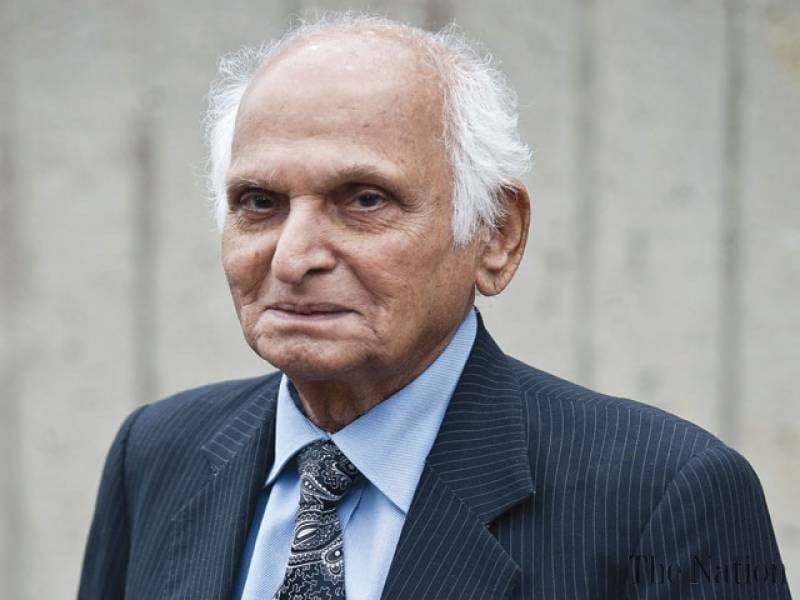
Mehmood Ul Hassan brings the great fiction writer’s life and views alive in the form of a valuable book

I saw him a few years ago at the Nairang Gallery where all the oldies of literature met every Sunday evening. Intizar Husain was then alive. I had to hand over a book by A.G. Noorani to Khaled Ahmed and there wasn’t a better place to catch him. This would also allow me a peep into the beloved company of the migrants from Pak Tea House at their new abode I thought.
Others present at the table were Masood Ashar, Ikramullah, Gulnar, Eruj Mubarak and of course a smoking Zahid Dar who sat on one corner of the table, almost isolated. A youngish man came holding a plastic bag in his hand and grabbed a chair. As the conversation moved between politics, literature and life, and memories faltered, this young man quipped with ready references and facts. Someone referred to him as Mehmood Ul Hassan.
When Intizar Husain passed away and we had to bring out a special issue on him in our paper, everyone I spoke to referred me to Mehmood Ul Hassan. He turned out to be a living encyclopedia on Husain and a very helpful one. He offered books, photographs, manuscripts and even requested Shamsur Rahman Faruqi to write something on Intizar Sahib for us, which he gratefully did. The subsequent years have been a journey of acquaintance with this talented man who is pursuing the difficult task of bringing out a literary page in Urdu journalism with remarkable ease and aplomb.
Hassan had the singular distinction among those of his generation to sit in Intizar Husain’s company for a number of years and enrich himself; only, he was wise enough to take copious notes of these conversations. Now close to Husain’s second death anniversary, he has produced a remarkable book on him called Sharf-e Hamkalami -- Intizar Husain se Baatain aur Mulaqatain.
Unlike the voluminous and definitive Chiragh-i-Shab-i-Afsana on the life and works of Husain by Asif Farrukhi, this one is a thin volume. It makes me particularly happy because it’s like the long interview with Intizar Sahib that I had always wanted to do. Dedicated to poet Ahmad Mushtaq, a close friend of Husain’s, it begins with a warm introduction of the book and author by critic Shamim Hanfi. There are interesting insights into partition, migration, his literary journey, association with Muhammad Hasan Askari, journalism, debates and controversies, progressive writers’ movement and Husain’s assessment of his own work in his words.
There is conversation about film, culture and friends. About the last, it is striking when he acknowledges that despite being a fiction writer, he mostly had poets as friends, referring to Nasir Kazmi, Ahmad Mushtaq and Munir Niazi, "because I wanted to discover what lies beyond this reality" -- which he found in poetry.
Intizar Husain’s evaluation of other fiction writers and critics, which he does with sound reasoning and precision, is especially valuable. He dwells not just on content but on how Urdu fiction and poetry adopted forms from the West, and what it lost or gained in the process. Having worked as a journalist, he recognises the not-so-fine line between fiction and journalism, and speaks critically about the journalistic expression of modern novels from Pakistan, especially in English language.
There are customary questions about his ‘ideal personality’, and he does mention one or two but the way he justifies them is worth reading. For instance, he admires Nazeer Akbarabadi’s open mindedness. "He had no biases in terms of culture or religion … his breadth of vision included different religious traditions with perfect ease," he says.
The books ends with critical assessment of Intizar Husain’s works by three authentic voices -- Shamsur Rahman Faruqi, Shamim Hanfi and Nasir Abbas Nayyar -- each focusing on different aspects of his writing.
Hanfi says the narrative in the book -- simple, familiar and interesting -- is such that it reads like a self-portrait of Intizar Husain. At times, one feels there should have been an exact sense of time when a particular view was expressed. The assumption is that all these conversations took place in the last seven or eight years before his death.
Mehmood Ul Hassan sits on a literary treasure. One hopes he will be sharing a lot more of it with the readers in times to come.